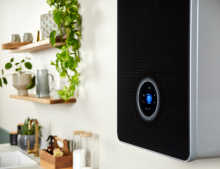Combi boilers are the UK’s most popular boiler, loved for their small size and big power. But what exactly is a combi boiler, how does it work, and is it the right choice for your home?
What is a combi boiler?
Short for combination boiler, a combi is a single solution to providing hot water and central heating in the same unit. That means no need for a hot water cylinder in your airing cupboard, or cold water tank in your loft.
Combi boilers heat water directly from the mains, when you switch on your tap or shower. They’re smaller than system or regular boilers and can operate at higher efficiency levels – making them the most affordable and flexible boiler type on the market.

How does a combi boiler work?
For central heating, combi boilers work by communicating with your room thermostats. When the temperature in your home drops below what you’d like it to be, your combi will fire up, draw water from the mains, and heat it as it travels towards your radiators. If you’ve ever heard your boiler click and whir, and your radiators begin to hum, this is what you’re hearing.
For hot water, combi boilers do the same thing but in response to a tap or shower being turned on. They draw water from the mains and heat it as it travels towards your kitchen or bathroom.
The unique feature of combi boilers, when compared to system or regular boilers, is that they combine both central heating and hot water inside a single boiler – and they heat water in real time rather than in advance.

How efficient are combi boilers?
Efficiency ratings are provided as percentages. The higher the percentage, the less energy is lost when your boiler burns fuel to provide heating or hot water. All our combi boilers provide at least 94% efficiency, so no more than 6% of energy is lost on running the boiler itself. By adding Worcester Bosch smart controls, which come with clever features like weather compensation and only firing your boiler up to quarter power, this can reach as high as 98%. The efficiency of our boilers is also rated on the ErP scale, which runs from A+++ to G. All of our combi boilers are rated A+.
Browse our combi boiler range
Our Greenstar range of combi boiler come in all shapes, sizes, and fuel types with up to 12 years of guaranteed coverage available.
What are my alternatives to a combi boiler?
Whilst combi boilers are easily the most popular type of boiler (especially in the UK where we have lots of small homes and apartments), they’re not always the most suitable type of boiler for every home. System boilers and regular boilers, which have been around for much longer than combis, can still be a better option in some cases:
Regular boiler
Regular boilers (also known as traditional, conventional, or heat only boilers) were one of the first modern types of boilers to become popular. They are well-suited to larger homes, because they utilise hot water and cold water storage tanks. Whilst these take up more space, they also provide access to more hot water during busy periods.
Combi boilers can struggle to keep up with demand in a busy household, because they have to heat water as it passes through the pipes – meaning there’s only so much it can do at once. Regular boilers are also a good choice for older homes, which have old radiators installed which wouldn’t be suitable for the high water pressure in a combi boiler system.
System boiler
System boilers require a hot water cylinder, but do not require a cold water tank – meaning they are a bit more suitable to smaller homes. The major heating and hot water components are also built into the boiler, like combis, which means a quicker and easier installation. System boilers are the middle ground between the other two boiler types.
Like combis, the heating technology is built into the boiler and they don’t need any tanks in the loft. And like regulars, their hot water tank means they can cope with busier households. They’re also in the middle when it comes to energy costs, using less than a regular boiler but more than a combi.
What are the downsides to a combi boiler?
Unless you live in a large or older home, a combi boiler can almost always going to be the right choice for you. But there are a few more things to bear in mind:
- If you live in an area with low water pressure, your combi boiler may not work effectively. This is because it draws water directly from the mains, meaning you don’t get the benefit of gravity that you would from a regular boiler system which has a water tank in the loft. If your water pressure is low, but you still want a combi boiler, talk to your installer about a booster pump.
- Combi boilers don’t come with immersion heaters, which means if the boiler breaks down then you’ll be without heating and hot water. The good news is that combi boilers are so widely serviced and spare parts so readily available that you shouldn’t be stuck for long.
- Power showers, which make use of a separate pump to provide extremely high water pressure, don’t work with combi boilers. This isn’t as much of a problem as it used to be, as regular showers (and various special attachments like pressure shower heads) can now provide much higher pressures than they used do.
Understanding fuel types for combi boilers
Our combi boilers are compatible with all fuel types – gas, oil, and LPG. Whilst most people’s choice of fuel type comes down to the location of their home, you can still choose the one that suits you best. There are also other fuel types (like electric, biomass, and perhaps even hydrogen in the future) but these are the most popular three and the ones most suitable for Worcester Bosch boilers.
Gas
Natural gas is the UK’s most popular domestic fuel, with 80% of homes running on mains gas. Gas is readily available through the mains network, widely supported in terms of parts and servicing, and can be extremely efficient when used with a high-quality boiler. Generally, gas is the default choice for most homes.
Oil
These days, oil is generally only used for rural properties where there isn’t a mains gas connection. Many oil boilers are installed outside the home, along with the tanks required to store the oil .Out of the three main fuel types, oil emits the most carbon.
LPG
LPG, which stands for liquid petroleum gas, is a similar type of fuel to natural gas. It can be attractive because it produces less carbon when burned, but it’s harder to come by parts and servicing, and you’d need an LPG tank on your property. This will need refilling when empty, so you need to be aware of your fuel levels and how much you’re using – plus the price of LPG can fluctuate over the year, and year to year.
Meet your new combi boiler
Get an instant online quote or arrange an engineer to visit you at home to discuss your options, and find the right combi boiler for your home.





